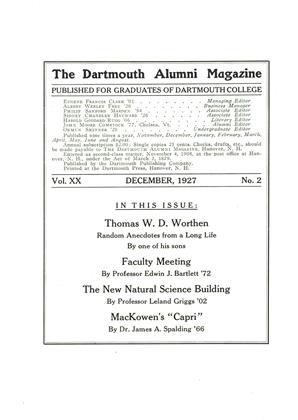"Van Winkle, '07, Investigates College Morals" a story by Kenneth Allan Robinson, may be found in the Saturday Evening Post for October 22, 1927.
A setting for unaccompanied male voices by Professor Homer Whitford of the Music Department, of Professor E. B. Watson's poem "Sancta Sophia" has been published by the H. W. Gray Company of New York. This composition is dedicated to the Dartmouth Glee Club.
The October 1927 issue of the American Historical Review contains an article "Standard Time in the United States" by Professor Robert E. Riegel.
Professor F. S. Page has published an article entitled "Living Stumps" in the October number of the Journal of Forestry.
"Rediscounting Rates and Federal Revenue Board" by Professor R. D. Kilborne is published in..Barron's for October 24, 1927.
"A Study of Stability of the Bredig Gold Sols" a dissertation submitted in partial fulfillment of the requirements for the degree of Doctor of Philosophy in the Faculty of Pure Science in Columbia University by Professor Fletcher Low 'l5, has been published in pamphlet form.
The Geographical Review for October 21, 1927 contains an article by Professor James W. Goldthwait entitled "A Town that has Gone Downhill." This article which is very finely illustrated with photographs and maps, refers to the town of Lyme, New Hampshire.
Professor Donald L. Stone is the author of an article on "The Uncertainties of our Constitution" appearing in the November number of the North American Review. Other recent publications by Professor Stone are an article on "International Relations in 1926" in the Americana annual encyclopedia for 1927, and a history of the "Stars and Stripes," the American soldiers' newspaper in France. The story of the "Stars and Stripes" appeared serially in the Editor and Publisher Weekly.
"American Opinion of German Unification, 1848-1871," By John Gerow Gazley, Assistant Professor of History in Dartmouth College. New York, Longmans, Green and Co., 1926.
Professor Gazley's monograph is a valuable contribution to an important and too much neglected branch of historical investigation. The part which public opinion has played in determning the course of history has not received the attention it deserves. It Seems probable that the main reason for the omission lies in the enormous mass of materials which must be examined if any worth while results are to be obtained. Professor Gazley has shown rare and commendable courage in not permitting himself to be deterred by that difficulty. As one who holds that for the modern field perhaps the most imperative duty now resting upon historians is a more extensive and more careful use of newspapers than has yet been attempted, I am delighted to find Professor Gazley's work coming fully up to the most exacting standards along that line. It is, of course, not possible for any man to examine thoroughly all the newspapers for any long period of time. But it is possible to examine enough of them so that further examination would in all probability simply confirm the results already obtained. This is exactly what Professor Gazley has done.
The scope of the book is even more extensive than its title would indicate. In order to explain satisfactorily the American attitude towards the movement for . German unity Professor Gazley has included a good deal about what Americans thought regarding Austria, Hungary, Denmark, and France. All of this is indubitably interesting and valuable, but I am of the opinion that it has been dealt with at greater length than was strictly necessary. In reading the book I have experienced one regret for which the author was in nowise to blame. To meet the requirements for a doctor's dissertation the book has been put into a form and published in a way which it is to be feared will restrict the reading of it to a small number of persons in academic circles. I am strongly of the opinion that both scholarship and public instruction would have been better served if a typewritten copy of the book in its present form had been placed on file in two or three leading libraries and a much shorter book, based upon it and containing its conclusions but addressed primarily to a much wider circle, had been put in print. In that form it would have made a 'wide appeal.
 View Full Issue
View Full Issue
More From This Issue
-
 Lettter from the Editor
Lettter from the EditorEditorial Comment
December 1927 -
 Article
ArticleTHOMAS W. D. WORTHEN
December 1927 By One of His Sons -
 Article
ArticleFACULTY MEETING
December 1927 By Professor Edwin J. Bartlett '72 -
 Article
ArticleALUMNI ASSOCIATIONS
December 1927 -
 Class Notes
Class Notes1918
December 1927 By Frederick W. Cassebeer -
 Class Notes
Class NotesClass of 1911
December 1927 By Nathaniel G. Burleigh
Frank Maloy Anderson
-
 Books
BooksAlsace-Lorraine Under German Rule
March 1918 By FRANK MALOY ANDERSON -
 Books
BooksGUERNSEY CENTER MOORE FOUNDATION LECTURES
April, 1923 By FRANK MALOY ANDERSON -
 Books
BooksTHE FRENCH REVOLUTION
February 1933 By Frank Maloy Anderson -
 Books
BooksSINCE THE CIVIL WAR
May 1936 By Frank Maloy Anderson -
 Books
BooksFRANCE 1940-1942, A COLLECTION OF DOCUMENTS AND BIBLIOGRAPHY.
November 1942 By Frank Maloy Anderson -
 Books
BooksFACULTY PUBLICATIONS
November, 1025 By Franklin Mcduffee, Frank Maloy Anderson
Books
-
 Books
BooksFaculty Notes
March 1948 -
 Books
BooksAlumni Articles
JANUARY 1965 -
 Books
BooksTHE KID NEXT DOOR,
August 1944 By Herbert F. West '22 -
 Books
BooksSELECTED WRITINGS OF OSCAR WILDE.
JUNE 1969 By JOHN HURD '21 -
 Books
BooksIN THE WORLD OF THE ROMANS
February 1946 By R. H. Lanphear '25 -
 Books
BooksINTERNAL STRUCTURE OF GRANITIC PEGMATITES.
December 1949 By Richard E. Stoiber '32


